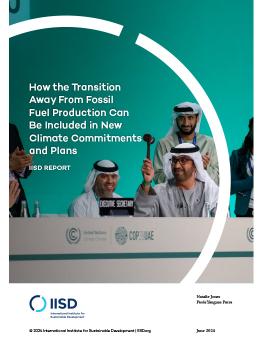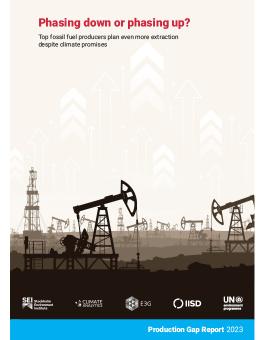Normalizing No New Fossil Fuels
Ending exploration for coal, oil, and gas is critical to stop climate change.
There is no room for new fossil fuel projects under a 1.5°C global warming limit—no new oil and gas fields, no new coal mines, and no new coal- and gas-fired power stations.
Governments agreed at the 2023 United Nations Climate Change Conference (UNFCC COP 28) in the United Arab Emirates on the need to transition away from fossil fuels in energy systems. A critical, achievable first step is to stop issuing licences for coal, oil, and gas exploration. This must be coupled with a vision to diversify economies built on fossil fuel extraction, creating opportunities for affected workers and communities.
Based on our agenda-setting research, IISD is engaging with governments and the public to establish “no new fossil fuels” as a benchmark for climate leadership.
Carbon Minefields: Monthly oil and gas expansion monitor
This newsletter provides monthly updates on key oil and gas expansion activities. It monitors the climate impact of countries and companies expanding their reserves by exploring new fields.

October 2024 | Carbon Minefields Oil and Gas Exploration Monitor
In September 2024, a total of 19 oil and gas exploration licences were awarded across eight countries, with a concerning estimated volume of embodied emissions reaching 147.1 million metric tons of CO2.

September 2024 | Carbon Minefields Oil and Gas Exploration Monitor
Last month, 11 oil and gas exploration licences were awarded across three countries. Among these countries, Australia awarded licences with the largest volume of embodied emissions.

August Edition | Carbon Minefields Oil and Gas Exporation Monitor
Last month, a total of 11 oil and gas exploration licences were awarded in five different countries. Among these, Morocco awarded licences with the largest volume of embodied emissions.
Publications

No New Fossil Fuel Projects: The norm we need
A new article in Science calls for an end to new fossil fuel projects, showing they are not needed in the energy transition to net-zero emissions.

How the Transition Away From Fossil Fuel Production Can Be Included in New Climate Commitments and Plans
This report describes how countries can reflect the 28th UN Climate Change Conference (COP 28) commitment to transition away from fossil fuels in their nationally determined contributions.

Transitioning Away From Oil and Gas
At COP 28, 198 governments agreed to transition away from fossil fuels. What are the next steps for a global phase-out of oil and gas production?

No New Fossil Fuel Projects: The logical first step in a transition to clean energy
Our experts propose a viable pathway to phase out fossil fuels, even when they are so embedded in people’s everyday lives, in the global economy, and in powerful political interests.

The Production Gap
The Production Gap Report measures the misalignment between governments' planned production of coal, oil, and gas and the global level consistent with meeting the Paris Agreement temperature goal.
Media Coverage
Oil and Gas Exploration Surges Despite Promised Transition Out of Fossil Fuels
Oil and gas exploration has surged to pre-pandemic levels this year, and Canada, the United States, the United Kingdom, Australia, and Norway account for two-thirds of the new oil and gas licences since 2020, IISD revealed today.
Canada among five "other petrostates" dooming Paris climate goals with oil and gas ramp-up
Canada has been called out as a "climate hypocrite" by an independent international sustainability think-tank for claiming to be a clean energy transition leader while stepping up the award of oil and gas drilling permits to levels not seen since 2017. Together with the United States, United Kingdom, Norway and Australia, Canada has this year granted oil and gas licences that could release 12 billion tonnes of CO2 into the atmosphere if "fully exploited," according to IISD.
Revealed: wealthy western countries lead in global oil and gas expansion
The new oil and gas field licences forecast to be awarded across the world this year are on track to generate the highest level of emissions since those issued in 2018, as heatwaves, wildfires, drought, and floods cause death and destruction globally, according to analysis of industry data by IISD.
NDCs, long-term strategies should include roadmap for fossil fuel producers: IISD
Analysis by policy think tank IISD shows that seven of the 20 largest fossil fuel producing countries make no mention of fossil fuel production in their Nationally Determined Contributions (NDCs) and six others stated an intention to continue or increase production.
Make New Fossil Fuel Projects Taboo to Meet Paris Goals, New Report Urges
Having proven that the world has enough fossil fuel projects to meet demand until 2050, researchers say a global norm against new projects—similar to the taboo against nuclear testing—would help phase down fossil fuels and achieve the goals of the Paris Agreement. In a policy paper for the journal Science, authors from University College London and the Winnipeg-based International Institute for Sustainable Development build the case for such a norm in three steps.
No new fossil fuel projects needed in the transition to net zero, study finds
A new study by researchers from University College London and the International Institute for Sustainable Development finds that there is "no room for new fossil fuel projects in a 1.5°C-aligned world."
Project team

Ivetta Gerasimchuk
Director, Energy Program, International Strategy

Olivier Bois von Kursk
Policy Advisor

Vance Culbert
Senior Policy Advisor & Secretariat Manager, COFFIS

Megan Darby
Senior Communications Officer

Natalie Jones
Policy Advisor

Greg Muttitt
Senior Associate

Eduardo Posada
Policy Analyst

Farooq Ullah
Senior Policy Advisor and Lead, Energy and Climate Governance
Latest
You might also be interested in
No New Fossil Fuel Projects: The norm we need
A new article in Science calls for an end to new fossil fuel projects, showing they are not needed in the energy transition to net-zero emissions.
How the Transition Away From Fossil Fuel Production Can Be Included in New Climate Commitments and Plans
This report describes how countries can reflect the 28th UN Climate Change Conference (COP 28) commitment to transition away from fossil fuels in their nationally determined contributions.
No New Fossil Fuel Projects: The logical first step in a transition to clean energy
Our experts propose a viable pathway to phase out fossil fuels, even when they are so embedded in people’s everyday lives, in the global economy, and in powerful political interests.
Transitioning Away From Oil and Gas
At COP 28, 198 governments agreed to transition away from fossil fuels. What are the next steps for a global phase-out of oil and gas production?
